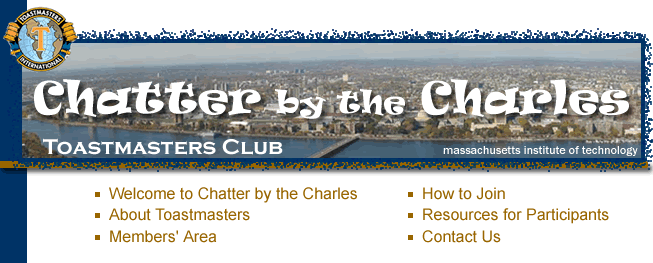![]()
| Meeting Roles | Officer Roles | Mentoring |
Meeting Role Descriptions
- Toastmaster
- Timer
- Grammarian
- Ah Counter
- Speaker
- Table Topics Master
- General Evaluator
- Speech Evaluator
Purpose:
The general evaluator is just what the name implies
- an evaluator of anything and everything that takes place throughout
the meeting. This includes leadership, mood, quality, timing and evaluation
of all participants other than the speakers. In addition, the general
evaluator is responsible for the evaluation team, and for running the
evaluation portion of the meeting.
Preparation: The Toastmaster will be contacting you to confirm your participation
and answer any questions you may have. If there are any evaluator or functionary
roles still open, work with the Toastmaster and VP of Education to get
them filled.
Review the duties of the General Evaluator and make sure you are familiar
enough with each of the other roles to be able to comment on them effectively.
Prepare a brief explanation of the purpose and importance of evaluation,
and think about different ways you might structure your comments. Remember
that the goal of evaluation is not to criticize, but to help others overcome
weak habits and build confidence and skill.
Several days before the meeting, contact each of the
Speech Evaluators to confirm their roles and urge them to be in touch
with their speakers. Also confirm role assignments with each of the functionaries
(Timer, Ah/Um Counter, Grammarian) and make sure that they understand
their duties. If evaluators or functionaries indicate that they cannot
fulfill their roles, ask if they would be willing to find replacements.
As you Arrive at the Meeting:
Make sure all evaluators and functionaries are present and prepared. If
a substitute is needed at the last minute, coordinate with the Toastmaster
and VP of Education to recruit one. Sit near the back of the room to allow
yourself full view of the meeting and its participants.
During the Meeting: When introduced by the Toastmaster after Table Topics, approach the
lectern, shake the Toastmaster's hand, and assume control of the meeting.
Briefly explain the evaluation portion of the meeting -- how it works
and why it is important.
Introduce each evaluator by name only (no introductory remarks) and
which speaker and speech they are evaluating. Lead the applause before
and after their evaluations, shaking hands to exchange control of the
lectern.
When the speech evaluations are complete, ask for the reports of the
Timer, Ah/Um Counter, and Grammarian, who will stand by their chairs to
give their reports. Lead the applause when they are finished.
Give your general evaluation, focusing on the role of the Evaluators,
Table Topics Master, and Toastmaster, as well as the meeting overall.
Limit your evaluation to three minutes, keeping in mind that it is not
necessary or practical to comment on every single item you observed.
Return control to the Toastmaster. Wait at the lectern to shake the
Toastmaster's hand.
Take notes on everything that happens (or doesn't but should) from the
moment you walk in the room to the time you give your report. Along with
your observations, think about specific things that individuals or the
club as a whole could do to improve.
After the Meeting:
If you have additional comments or suggestions for future meetings, share
them with the President or another club officer.
Helpful Links:
Checklist for General Evaluators
District 52's General Evaluator Role sheet includes checklists for
evaluating Table Topics Master and Toastmaster (PDF)
